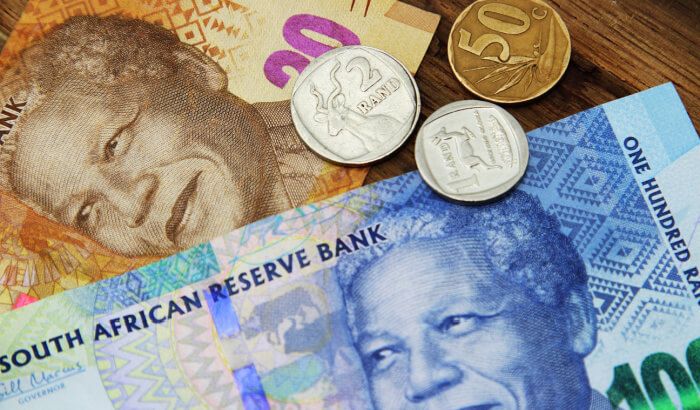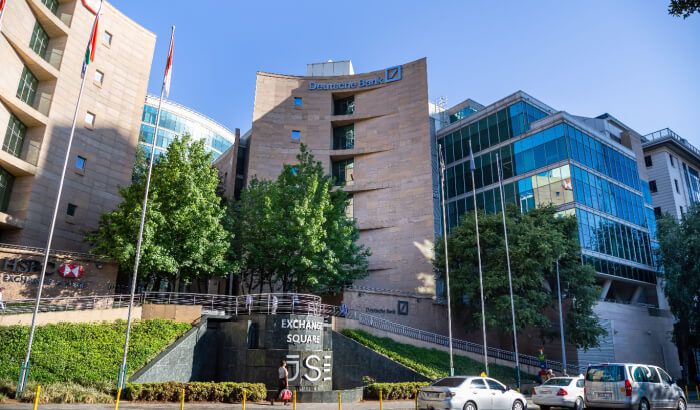

Our company name has changed from Finalto International Ltd to Markets International Ltd.
What's staying the same?
There are no changes to your experience
If you have any questions, our support team is here to help via phone, Live Chat or email support@markets.com
You are attempting to access a website operated by an entity not regulated in the EU. Products and services on this website do not comply with EU laws or ESMA investor-protection standards.
As an EU resident, you cannot proceed to the offshore website.
Please continue on the EU-regulated website to ensure full regulatory protection.
Tuesday Sep 5 2023 07:45

6 min

On Monday, the FTSE/JSE South Africa Top 40 Index posted growth of 0.86%, following a similar rise in the broader JSE All Share index (JALSH), which recorded a 0.8% increase, closing at 75,375 and marking its highest level since August 15th.
The upward movement was primarily driven by strong performance in key sectors, including a 2% rise in tech heavyweight Naspers (NPN), as well as gains in industrials (1.1%), resource-linked sectors (0.6%), and financials (0.6%).
In January, the Johannesburg Stock Exchange (JSE) achieved a record high as the all-share JALSH index surged to 78,450 points. This elevated performance has been sustained throughout the year.
Throughout the day, investors remained focused on assessing the possibility of a pause in the U.S. Federal Reserve's interest rate hikes while also considering the impact of stimulus measures in China.
Сalculate your hypothetical P/L (aggregated cost and charges) if you had opened a trade today.
Market

Instrument


Account Type
Direction
Quantity
Amount must be equal or higher than
Amount should be less than
Amount should be a multiple of the minimum lots increment
USD
EUR
GBP
CAD
AUD
CHF
ZAR
MXN
JPY
Value
Commission
Spread
Leverage
Conversion Fee
Required Margin
Overnight Swaps
Past performance is not a reliable indicator of future results.
All positions on instruments denominated in a currency that is different from your account currency, will be subject to a conversion fee at the position exit as well.
On the domestic front, attention turned to the impending release of South Africa's Q2 GDP figures, which are scheduled to be released today.
Additionally, national power utility Eskom announced its intention to continue implementing Stage 5 load shedding from 4 pm and Stage 4 from 5 am until further notice. This decision comes as a response to the need for increased levels of rolling blackouts to replenish emergency generation reserves.
"The economy held up better than expected in Q2, as load-shedding was less severe than in Q1," said Nedbank's Group Economic Unit in a research note, referring to the country's rolling blackouts.
Nedbank has forecasted a quarter-on-quarter GDP growth of 0.4%. However, the bank also cautioned that this resilience is expected to diminish as the national utility Eskom intensifies maintenance activities during the southern hemisphere's summer months.
The OECD has projected South Africa’s growth to slow to 0.3% in 2023 before picking up to 1% in 2024.
“Investment will become a much-needed driver of growth as the energy crisis requires additional power generation capacity. Higher interest rates and inflation are denting consumption, while electricity outages and lower grobal growth are weighing on exports,” the organization wrote in a regional snapshot published in June.
South Africa's sluggish growth has been influenced by severe power shortages, fluctuating commodity prices, and a difficult global economic landscape influenced by inflation, high interest rates and the continuing fallout from the Russian invasion of Ukraine.
With a total capitalization of $1,16 trillion as of July 2023, the JSE stands as Africa's foremost stock market and ranks as the 19th largest globally.
Most companies listed on the exchange primarily earn a significant portion of their revenues in the South African currency, the rand (USD/ZAR). However, among the largest listed companies, there are those with substantial international operations.
This group encompasses mining giants such as BHP Group, Anglo American (AGLJ) and Glencore, as well as multinational corporations like British American Tobacco, beverages multinational AB InBev and the luxury goods manufacturer Richemont. Many of these firms also have listings on international stock exchanges.
The largest companies listed in South Africa include Naspers, a significant player in the internet and technology investment sector, boasting a market capitalization of $33.6 billion, as per CompaniesMarketCap. Additionally, the financial services titans FirstRand, Standard Bank and Investec hold prominent positions, as does MTN Group — Africa’s largest mobile operator.
Naspers, through one of its subsidiaries, holds substantial investments in the Chinese technology firm Tencent. Back in 2001, Naspers acquired a 46.5% stake in Tencent for a mere $32 million. While it has since reduced its ownership to 29%, the value of this stake has soared to over $200 billion.

Despite facing challenges such as elevated inflation, which reached 4.7% in July, along with high unemployment, sluggish economic growth, crime, and corruption, the Johannesburg Stock Exchange (JSE) has maintained its robust performance. The growth comes even as the country is grappling with its most severe power outages, lasting up to 16 hours a day.
The FTSE/JSE Africa All Shares Index (JALSH) represents the market capitalization of 99% of all ordinary securities listed on the main board of the JSE, without applying any investable weighting.
The JSE Top 40 index effectively mirrors the dynamics of the South African stock market. Despite consisting of only 40 out of the roughly 400 shares available on the JSE, it represents more than 80% of the overall market capitalization of all the companies listed on the exchange. The index has grown close to 14.5% year-to-date, according to data from the Financial Times.
Companies included in this index are the 40 largest companies by market capitalization included in the JALSH. The JSE Top 40 can be readjusted, with constituents added or removed depending on the size of their market capitalization — the total value of their outstanding shares.
When considering stocks for trading and price predictions, remember that trading CFDs involves a significant degree of risk and could result in capital loss. Past performance is not indicative of any future results. This information is provided for informative purposes only and should not be construed to be investment advice.
Risk Warning and Disclaimer: This article represents only the author’s views and is for reference only. It does not constitute investment advice or financial guidance, nor does it represent the stance of the Markets.com platform. Trading Contracts for Difference (CFDs) involves high leverage and significant risks. Before making any trading decisions, we recommend consulting a professional financial advisor to assess your financial situation and risk tolerance. Any trading decisions based on this article are at your own risk.
Asset List
View Full ListLatest
View allSaturday, 18 October 2025

5 min
Saturday, 18 October 2025

5 min
Saturday, 18 October 2025

3 min

